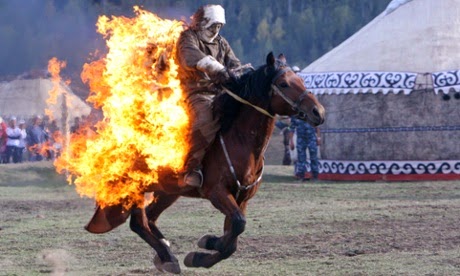More
than 400 athletes from 19 countries competed in the week-long nomadic games
marathon to bolster national identity and strengthen diplomatic friendships. EurasiaNet
reports
By Alisher Khamidov
 |
An athlete takes part in the World Nomad Games in Cholpon-Ata, around 170 miles
from
|
In
the spring of 1206, legend has it, the Mongol steppe saw the largest-ever
gathering of nomadic tribes. Featuring athletic competitions and festivities, the
weeks-long event marked the unification of warring Mongol tribes under the
leadership of Genghis Khan, the legendary Mongol conqueror.
The
Mongol Empire is now history, but the idea of using nomadic sports to unify a
nation has lived on in the relatively new independent state in Central Asia as it searches for an identity.
With
generous government support, Kyrgyzstan hosted the first World Nomadic Games
last week, an event “dedicated to show the history of nomad nations, their
traditions, lifestyles and culture,” according to the organisers.
Over
400 athletes from 19 countries gathered in a resort on the shores of Lake Issyk-Kul
The
Kyrgyz government cast the Games as an event of global significance, with a
strong undercurrent of nation building. “The Games will give a powerful boost
to rehabilitating original national sport disciplines and reviving the
spiritual consciousness and historical memory of nomadic peoples of the world,”
said a statement posted on the official website.
President
Almazbek Atambayev, who has called 2014 the year of strengthening Kyrgyz
statehood, made no secret of his nation-building intentions. “The Kyrgyz people,
with their rich history, culture, and traditions, were among the early nations
that founded nomadic civilization. Let us follow the good legacy of our
ancestors in joining ranks and building our future!” Atambayev said at the
official opening ceremony.
Supporters
hail Atambayev’s initiative. “The Games were the first event in Kyrgyz history
that brought the whole nation together. When Atambayev walked [into the
hippodrome] with the Kyrgyz team, spectators stood up, and there were tears
many people’s eyes,” Danir Imanaliev, deputy head of Issyk Kul region, who
helped organise the Games, told EurasiaNet.org. “The whole nation felt pride
and unity at that moment.”
The
Nomad Games are also part of Atambayev administration’s objective of
strengthening collaboration among Turkic-speaking nations. The idea of the
Games first appeared during the 2011 visit of Turkish Prime Minister Recep
Tayyip Erdoğan to Kyrgyzstan Turkey
Indeed,
decades of talk of Turkic brotherhood (four of the five Central Asian nations
plus Azerbaijan republic of Tatarstan
 |
Kyrgyz artists perform 'Kyrchyn' during the games
Kyrgyz artists perform ‘Kyrchyn’ during the games Photograph: Igor Kovalenko/EPA
|
Locally,
reactions have been mixed. In the lakeside resort town of Cholpon-Ata
“I
am also proud of Kyrgyz team which won many medals and became famous around the
world!” said Jailkan Ismailova, 85, a retired teacher. “I am very grateful to
Atambayev for putting together such a great show worthy of the praise of our
ancestors.”
Others
were not so upbeat. Several spectators slammed organisers for failing to
provide enough toilets or even a schedule of events.
“Of
course, there are flaws when you have little time to prepare. But keep in mind
that glitches happened even at the [2012] London Olympic Games,” one organiser
said on condition of anonymity.
If
Atambayev’s administration was hoping the events would unite the Kyrgyz nation,
such hopes appear to be ill-founded. Concerns about lavish spending dogged the
run-up to the Games, prompting the Culture Ministry to announce it was dropping
its budget from $3million (£1.85m) to $1.5million.
For
several residents of southern Kyrgyzstan
Unsurprisingly,
in a country where transparency is always a concern, some media outlets accused
organisers of pilfering state funds.
 |
Kyrgyz artists perform during the games
Kyrgyz artists perform during the games Photograph: Igor Kovalenko/EPA
|
As
for uniting the nation, some minorities found the emphasis on ethnic Kyrgyz
traditions insulting. “All these celebrations honour only Kyrgyz history, traditions,
and culture. They [Kyrgyz officials] pay little or no attention to
contributions [to Kyrgyz statehood] made by others [ethnic groups such as
Uzbeks, Russians, and Tajiks],” said Khusanboy, an ethnic Uzbek construction
worker from Osh, who declined to give his family name, citing concerns for his
safety following ethnic violence in his hometown in 2010.
The
Games ended with music and fanfare on Sunday, but the question lingering on the
minds of many participants is whether Kyrgyzstan
Agamurat
Bayramov, a journalist with Turkmen State TV who was covering the Games, said
the burden was now on Kyrgyzstan


